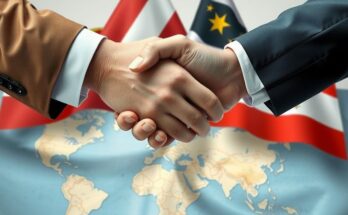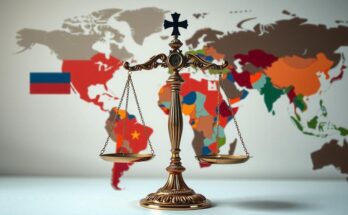Iraqi Prime Minister Mohammed Shia al-Sudani’s discussions with King Charles III in London in January symbolized Iraq’s significant transformation into a sovereign partner, marked by a GBP12.3 billion agreement. The cooperation extends to various sectors, including energy and education, highlighting Iraq’s rise as an appealing investment destination. The evolving political and security landscape further supports Iraq’s diplomatic ambitions and regional stability efforts.
The meeting between Iraqi Prime Minister Mohammed Shia al-Sudani and King Charles III in London on January 14 was significant, signaling Iraq’s evolution into a sovereign partner rather than a supplicant nation. Two decades after Saddam Hussein’s regime fell, Iraq is now engaging as an equal with global powers, illustrated by a substantial GBP12.3 billion partnership agreement with Britain.
The partnership agreement reflects Iraq’s transformation from a pariah state into a nation actively pursued by international allies. This marked a departure from Iraq’s troubled past characterized by dictatorship, war, and extensive violence. Today, Iraq negotiates massive infrastructure investments while committing to environmental initiatives, showcasing a robust engagement with global business leaders.
With agreements covering various sectors, including water infrastructure, energy, and education, the significance of this partnership extends beyond economics. Shell’s CEO’s eagerness to invest in Iraq’s energy sector further emphasizes the nation’s newfound status as a viable investment destination, progressing past its historical challenges.
The collaboration between British and Iraqi law enforcement, specifically the presence of National Crime Agency officers in Kurdistan, signifies mutual trust and cooperation in addressing human trafficking. This collaboration reflects a transformation towards partnership among equals, with shared commitments to combat pressing challenges.
The plans for Iraqi students to study in British universities represent a significant shift in Iraq’s image, allowing youth to build international connections and capital. This educational initiative reinforces the notion of Iraq as a developing nation rather than one solely composed of asylum-seekers.
Iraq’s emerging stability is rooted in its evolving political environment, which is working to mitigate sectarian divisions. Prime Minister al-Sudani leads a coalition government formed after the 2021 elections, demonstrating increasing political maturity and a focus on national interests.
Al-Sudani’s government actively prioritizes combating corruption, enhancing public services, and rebuilding infrastructure. His administration has focused on urgent needs in energy and agriculture, reflecting an understanding of the citizens’ desire for tangible improvements in daily life.
Following the defeat of ISIS in 2017, Iraq has shown marked security improvements, reclaiming territory while still navigating the influence of militias. The increased capability of the Iraqi Armed Forces is pivotal for maintaining order amidst external pressures, including Iranian influence.
With rising oil revenues, Iraq has started investing in infrastructure and social programs. However, the economy’s reliance on oil exportation presents a vulnerability, necessitating diverse policies to ensure sustainable growth. The youth-driven protests of 2019 highlighted the public demand for progressive changes and reforms in governance.
On the international front, Iraq has positioned itself as a mediator among regional powers, promoting economic cooperation and diplomatic initiatives. By cultivating relations with neighboring countries, Iraq is striving to become a stabilizing force in a complex regional landscape.
Iraq’s post-Saddam era has been marked by significant political, social, and economic transitions, evolving from a country ravaged by dictatorship and conflict to a nation seeking sustainable partnerships and development. The visit of Prime Minister al-Sudani to London symbolizes the culmination of these developments as Iraq repositions itself in the global arena, emphasizing collaboration over isolation and conflict.
The visit of Prime Minister al-Sudani to London has marked a pivotal moment for Iraq, demonstrating the nation’s readiness to engage with global powers as an equal partner. With substantial investments in infrastructure, education, and security cooperation, Iraq’s transformation embodies a significant departure from its tumultuous past. As the country continues to navigate challenges while fostering diplomatic ties, its commitment to collaborative progress suggests a promising trajectory towards stability and growth.
Original Source: www.intellinews.com




